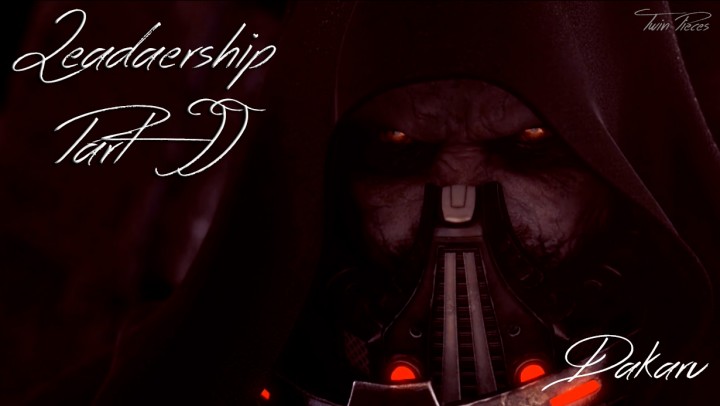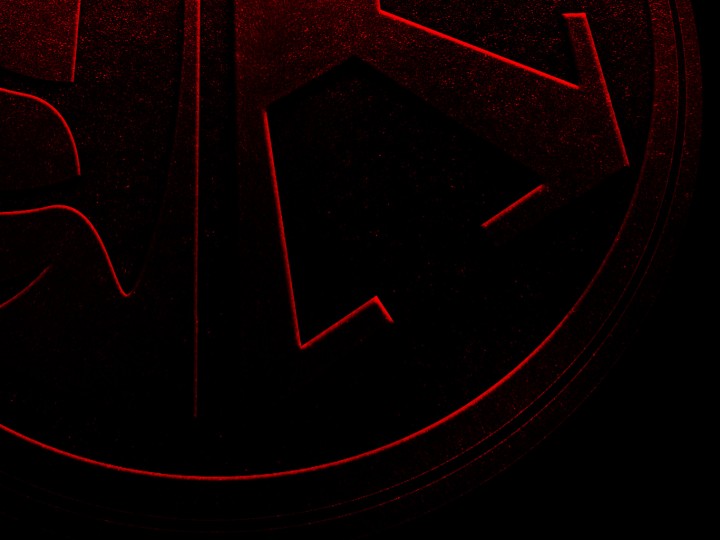So this week Rav and I will be doing another twin piece post on in-game leadership. For my second article on the subject I decided to get in touch with Dakaru, GM of Nostrum Dolus and team leader of the ND ranked team. Him and his team were, to be blunt, hated by many, but their combined level of skill was unmatched on the server they played. It is surely one of the reasons they generated so much hate. Dakaru has since moved on from SWTOR and is currently playing Evolve where he is again finding himself in a leading position.
To give a bit of background, Dakaru started out as an officer in Nostrum Dolus back when it was mainly a PvE guild. He was most interested in PvP himself which led to Dakaru being given a leadership role in ranked when that came into the game. Eventually the GM and Co-GM quit the game and Dakaru took over leadership of the guild. As he did so many of the PvE players in ND were quitting and Dakaru ended up slowly turning ND into a more PvP oriented guild. The ranked team he collected was a slow progression according to Dakaru. “I got as many good players as I could find together, and kept shuffling around over and over”, he tells me. By the time of the transfer to Nightmare Lands the game had lost a lot of players and so had Nostrum Dolus. They ended up merging their ranked team with another team who had lost a lot of people as well.
What was your main focus as the team leader? What was the key to your success?
“I don’t know, just getting people together. Focusing on getting everyone to do their job, and not think about themselves so much. Work as a team, put aside your pride and just focus on the objective, which was winning. That was definitely key”, says Dakaru. “I think another thing was how small we kept our group. We also started theorycrafting from very early on in the game at which point maybe other guilds were playing around casually still.”
What specific qualities in you brought you and ND to the competitive success that you had?
“I think a little bit of diplomacy skills in regards to how to deal with my guild. Also just having a vision. Trying to visualise how I want things to be, what tactics would be good, what roles would work, how to adjust, what players would be best. You get really passionate at some points about the games you play and you lie in bed thinking things over, how I want to do this, just visualising what needs to be done. Trying to find solutions. Kinda obsessing over it”, Dakaru tells me and laughs. “One of the most difficult things was to replace people though. Either because they weren’t good enough or because their class wasn’t working out. To be at top level you have to be competitive; you have to work out the best way to do things. Which are the best players, which are the best classes for us, which are the best talent specs or skills.”
It sounds like you enjoyed it?
“I like optimising, yeah”, Dakaru responds. “Of course I enjoyed it yeah, it was so much fun. I didn’t enjoy the drama though to be honest, like there was a lot of drama. People got quite angry with us when we were winning a lot.”
Was it mostly external drama directed at the guild as a unit or was there also a lot of internal drama within ND?
“There was some internal drama sometimes”, Dakaru retorts. “There are sometimes egos or IRL problems complicating things. People suffering from insecurities and stuff like that. It would have affected the guild as well. But it was mostly the outside drama. People got so angry with us sometimes. I didn’t enjoy that, it was the thing I hated the most honestly. We were constantly called assholes, or jackasses or whatever. We were name called a lot. At some point people basically didn’t want us to queue anymore. I know they didn’t always have fun, we didn’t always have fun either. But to be fair we just wanted to play you know. There wasn’t anyone at the time that could really compete with us at that point.”
Server merges was a good thing for you guys then.
“Yeah for sure”, Dakaru answers. “Teams like Reality Check eventually got a more solid team together to compete against us.”
What was the biggest challenge leading ND’s team in ranked?
“Well like I said earlier, what I really hated was to replace people”, Dakaru echoes. “Getting people organised to come and play was also a struggle. For eight, people to find time to play can be difficult. Especially since we kept the group so small. I think that was definitely the toughest, organising play.”
In a high end guild like ND where I assume there are a lot of big personalities, did everyone always get along and how did you handle conflict within a group?
“You know sometimes you just have to yell at each other and take some time off, it happens. How did I handle conflict? Hm. Yeah negotiate, try to make the best out of it”, Dakaru replies. “People would kinda come to me to resolve things, being the GM. I was kinda the mediator usually, trying to keep cool and relaxed. Say ‘that’s okay’, ‘shit just happens’, stuff like that. You know people get heated over things when they go wrong. When someone makes a mistake, sometimes people can be really harsh to blame. They might be a little bit insecure themselves and lash out because of it.”
How is your own patience?
“Most of the time it’s good. In general I think I am a patient person but there are times where I am not very patient at all. Usually when I haven’t had enough sleep. If I have had enough sleep I am fine”, Dakaru answers.
How did you handle recruitment and what kind of players where you looking for?
“Usually there was like 1 slot that we really needed to fill, and then it was class specific” Dakaru explains. “We would then be looking for the best player of that class. Otherwise it was usually in regs, just seeing good players. Like ‘ah let’s play some more together’. See how good they were and eventually it builds up and you might try them out in ranked. But we didn’t recruit that often for the ranked team, because we worked towards a really steady group basically.”
What was your proudest moment of leading ND?
“That is tough to recall”, Dakaru says and stays quiet for a little while. “I’d say the proudest moment was a Ancient Hypergate on 2.0 beta back on the PTS against an American team.”
<Hey I’m MVP>?
“Yeah, that’s them”, Dakaru answers. “I basically didn’t have to lead anymore. Everything went like a well-oiled machine. Someone else was target calling, everyone was very communicative and I didn’t have to do anything. Yeah, that was a near flawless game of ours. I’d say that has to be my proudest moment.”
You still play with some of them in Evolve now, right?
“Yeah with two of them actually”, Dakaru confirms.
What are some of the greatest challenges that you have met as a leader of the Evolve team you are leading now?
“Finding people to practice with for sure”, Dakaru responds. “And getting everyone together to play actually. It’s only 4 now, but it’s still really tough to get everyone together to play because they have other obligations to attend to.”
What is the main differences in having a team leading role in SWTOR and Evolve?
“Well in SWTOR there were more players to manage”, Dakaru says. “It complicated things more, it was harder but it was also more diverse. Even in Evolve now it becomes very stale to be honest. You figure the tactics out and you have to follow them without making any mistakes. It was different in 8v8.”
It sounds like you preferred SWTOR?
“Well, I prefer 8v8. It was more fun and diverse”, Dakaru replies.
It’s strange though that you left SWTOR because of the changes in the ranked system converting 8v8 to 4v4, and you moved on to Evolve which puts you back in a four man team.
“It’s 4v1, yeah. Well there aren’t many really competitive games with 8v8. Mostly 5v5 or 4v4”, Dakaru says.
Through your time gaming and leading teams, how have you handled your methods being questioned?
“Well it’s unavoidable really. Your leadership is going to get questioned”, Dakaru tells me. “People are always going to disagree with you at some point. You have to try to discuss it with them. Sometimes you got to give in and say like, ‘OK, let’s try it your way see how that goes’. Other times you have to put your foot down and say ‘Right now I’m making the final call, we’re doing it this way. You might not like it but it’s just how we’re going to do it.’ It’s about finding that balance. It’s important to first discuss things first though, people have to feel like they’re being listened to. Sometimes they will be so passionate that it will be easier to say ‘Alright, you’re not gonna give up, let’s try it your way’.”
What are the key aspects to successfully handling a team of players in an online environment?
“Well, what I discussed before really. You have to listen to others as well”, Dakaru answers. “You have to, you can’t just always do what you think is best. Sometimes you just have to listen to others you have to think it over, try other things. Be open minded. And give clear directions. You have to be very vocal and clear, and not allow any confusion.”
What would you say is most important as a leader, to be good at handling conflicts when they arise or to recruit people who are focused on the goal and won’t get distracted that way?
“Ah a little bit of both I’d say”, says Dakaru. “You have to think about it, balance it again. Sometimes a player is so good that you’re willing to put up with some drama, you just deal with it. Other times it’s just not worth it. We definitely had a few people who could get very emotional and a few others who would never get emotional. They’d always stay focused on the job and never argue with people. It was a very diverse group, I’ll tell you that much.”
You seem to be remembering it very fondly.
“For sure, I still remember all those guys. Many fond memories”, Dakaru responds.
As a leader would you say it’s better to be sympathetic and approachable or just like relentlessly systematic and strict? What will give you the best result?
“I do definitely prefer sympathetic. I think that’s overall more important”, Dakaru answers without hesitation. “Like sometimes you have to be ruthless. Sometimes I wasn’t ruthless enough. Like cutting people off the team. To be successful you have to be ruthless with that. I feel like I came up short on that a little bit. But other than that I think it is overall more important to be sympathetic and understand your team. Listen to them. There were plenty of really smart people in our team. I eventually trusted them more to take over some leadership roles. We had someone else as a target caller eventually. I didn’t do that anymore. Someone else did other things. Yeah, it was definitely not all me anymore. I took a backseat role eventually. I would discuss with the guys after the games how to best adjust our tactics and strategies.”
———————————————————————
So there we have it; the formula for successfully maintain a top tier team like Nostrum Dolus. Be proactively optimising your teams set up, be goal orientated and be able to spot and utilise player potential. It’s obvious from talking to Dakaru that he was incredibly passionate about what he was doing. Without that I think it would have been difficult to summon the energy needed to keep going at the same speed.
Something I also found interesting was the answer I got from asking Dakaru’s proudest moment. It had more to do with his team and not so much himself. This coincides with the general impression I’ve gotten from him. Though his team was a well known one he didn’t seem to crave much individual attention from the community.
I think one of the things which is important for a leader of any function is that the person experiences a strong sense of achievement by the accomplishments of his or her group. Through that the leader will feel boosted because he or she was the one that helped the team get to that point. I would say this is important not because I regard an altruistic nature very highly. No, it’s more about the fact that the leader’s self evaluation and their image of them self will be tied directly to the performance of the group. This instead of making sure he or she always looks good and that there is someone else to blame in case something goes wrong. A good leader takes responsibility together with their team when they mess up. A possible downside to this type of leader is that the attachment to the team and it’s members can create the kind of loyalty that blinds him or her from making the best choice in certain situations. This can show itself as unwillingness to replace members who for whatever reason don’t fit the team. It can also lead to the desire to defend actions and behaviour out of loyalty even if they would have criticised the same behaviour had it been exhibited by someone outside the group.
Another downside to this type of leader is that they often stress themselves out by taking on so much responsibility. When they do they might even become ineffective in their role. Especially if the person is struggling with a team that for whatever reason does not get to experience much success. This leader type will then quickly find themselves feeling very drained on energy. They might take on more and more responsibility, pushing themselves past all comfort zones to get the progression they want. If the group still experiences slow development this type of leader might get burnt out before they got very far.
These leadership interviews have been very interesting for me to conduct. If you are interested I have made a bonus post evaluating the information I have gathered in these two interviews and compared the two guilds and the guild leaders with each other. To read this conclusion, follow this link to the “Leadership comparison: RC vs. ND“ article or to read the leadership interview with RC GMs follow this link.
And don’t forget to check out Rav’s interview with PCG GM and The Senate Guard!






